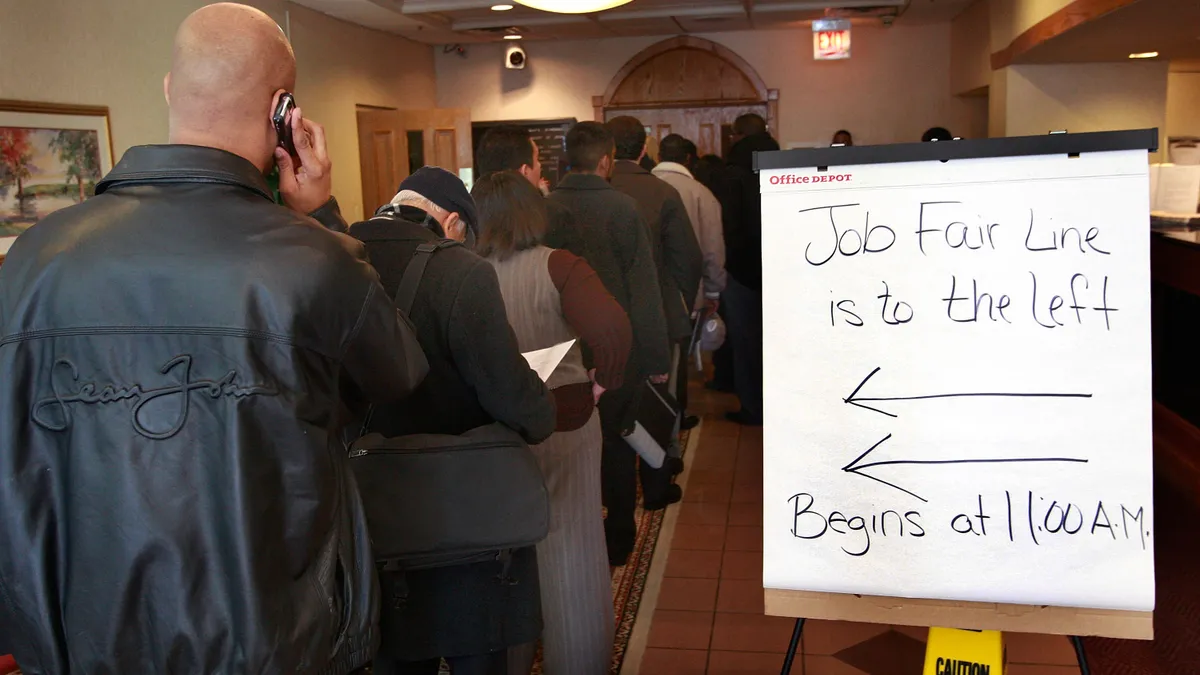Fifty-two percent of U.S. workers now fear job displacement due to artificial intelligence — nearly double last year’s level, according to survey results released Monday by KPMG.
A report on the findings calls on business leaders to deepen their commitment to preparing workers for an AI-driven future.
“Workers are using AI to become more effective, but they don't see how that effectiveness translates back to them,” Katie Dahler, human capital advisory leader at the Big Four accounting firm, said in a press release. “By reinvesting AI-driven productivity gains into the upskilling that employees are demanding, companies can prove they see their people as partners in transformation and build trust for the long term.”
CFOs are divided on what AI means for the workforce, Economist Impact, a think tank operated by global media company the Economist Group, found in a separate study released this month.
Forty-two percent of finance chiefs view headcount reduction as the clearest way to demonstrate a return on investment from AI spending, according to the think tank’s research, which was sponsored by SAP. Yet around the same proportion (43%) disagree, arguing that headcount reduction is a narrow and potentially short-sighted metric.
“The rise of AI has sparked difficult conversations about disruption, cost pressures and possible workforce reductions,” Economist Impact said. “Finance leaders must make decisions on upskilling, headcount management and the pace of technology adoption — all while keeping up in an increasingly competitive AI race.”
A study by the Federal Reserve Bank of St. Louis released in late August revealed “a striking correlation” between AI’s prevalence and unemployment increases since 2022, particularly in technology sectors.
“Our results suggest we may be witnessing the early stages of AI-driven job displacement,” the authors wrote.
The issue is attracting attention on Capitol Hill. Earlier this month, Sens. Josh Hawley (R-Mo.) and Mark Warner (D-Va.) introduced legislation (S. 3108) that would require entities such as publicly traded companies and federal agencies to report AI-related layoffs to the Department of Labor with the goal of compiling that data into a publicly available report.
“Artificial intelligence is already replacing American workers, and experts project AI could drive unemployment up to 10-20% in the next five years,” Hawley said in a press release. “The American people need to have an accurate understanding of how AI is affecting our workforce, so we can ensure that AI works for the people, not the other way around.”
A panel of big tech executives speaking at a virtual conference hosted this month by the Financial Executives International presented a rosier picture of AI’s impact on the workforce.
“There’s so much rhetoric around the machines taking our jobs… but we have to think about AI as a tool that’s going to strengthen our human capabilities,” Danielle Fontaine, an assistant controller at ServiceNow, said during a session on AI use cases in the finance function.
Denise Lucas, a vice president and assistant controller at IBM, echoed those comments, saying she “strongly” disagrees with reports indicating that AI will take jobs away from accountants.
“It’ll change tasks; it’ll take away some tasks… but AI hallucinates, and the people who are going to be able to point that out… are subject matter experts, who can think critically and work with other people,” Lucas said. “All of those inherent human skills aren’t going away, and I think they’ll be amplified more in this next phase.”
As ServiceNow introduces AI into its finance processes, the company is striving to bring “the entire finance org along,” according to Fontaine. Among other opportunities, ServiceNow workers interested in gaining more knowledge about the technology can participate in the company’s “School of AI,” which meets monthly, she said.
While 85% of companies provide some form of AI training, 84% of employees say they need more of it, according to KPMG. Less than half of organizations make AI training mandatory, “sending a mixed signal about its importance,” the accounting firm said.
Three-quarters of employees (77%) report that AI helps them focus on higher-value work, yet they also worry that it will be able to handle more than half of their role within two years, KPMG said.
“Organizations must recognize this tension and seize the moment by reshaping workforce strategies now for an AI-driven future,” according to the Monday report. “That means planning for new skills and roles, guiding employees through change, and creating clear career pathways so that people feel supported.”
KPMG said it polled more than 2,100 U.S.-based full- and part-time employees across a wide range of major industries. Participants were multi-generational and filled a variety of roles across organizations with more than 5,000 or more employees. The survey was conducted in June and July.






















